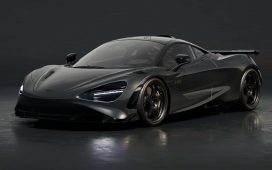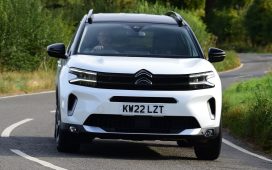Jaguar Land Rover has said it will spend half a billion pounds to upgrade a Merseyside factory to build hybrid cars and prepare for electric vehicle production.
Britain’s largest automotive employer – officially known as JLR – said it has already spent £250m on new car production lines, machinery, people and digital technology at the Halewood plant, with plans for £250m more over the coming years.
The investment will eventually allow Halewood to produce electric versions of its medium-sized SUVs, the Discovery Sport and the Range Rover Evoque, as well as traditional internal combustion engine versions and hybrids.
JLR, owned by the Indian conglomerate Tata, has been slower than many rivals to embrace electric cars, selling just one model, the ageing Jaguar I-Pace. But it is investing £18bn to produce battery versions of its lineup alongside petrol cars, starting with the first deliveries of the electric Range Rover, made in its main factory in Solihull, in the West Midlands, at the end of next year.
The Halewood plant was first built in 1963 to make the Ford Anglia, which featured as a flying car in a Harry Potter book and film. It produced various Ford models until the Escort was phased out in 2000, making way for Jaguar and then Land Rover when Ford owned the British marques.
Tata bought them in 2008. Tata is also spending heavily on a new battery factory in Somerset to supply JLR, and on switching its steelworks in Port Talbot, south Wales, to electric technology.
The upgrades to Halewood – including robots and new ovens for drying paint on car bodies – will allow “parallel production” of battery cars and those with internal combustion engines, allowing the company to respond to shifting demand. Barbara Bergmeier, the JLR executive director of industrial operations, said that Halewood “will be our first all-electric production facility”.
Investments such as solar panels and energy efficiency measures will also avoid 40,000 tonnes of CO2 equivalent each year from the factory.
after newsletter promotion
JLR’s decision not to race towards all-electric production has proved financially savvy, particularly as growth in demand for electric cars has plateaued in several important markets. After several years of cost-cuts and losses, it has reported a string of strong profits. It published record revenues of £7.3bn for the April-to-June quarter on the back of strong sales of its more expensive Range Rovers.
However, the company will have to contend with UK rules, known as the zero emission vehicle mandate, that force manufacturers to increase sales of electric cars this year.
JLR has previously said that it plans to increase production of battery cars in later years to avoid fines for missing electric sales targets in 2024, although that ambition could prove problematic if electric demand does not return to rapid growth.











